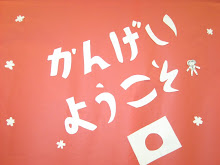Friday: September 11, 2009 An Eight Period Day
JAPANESE 3 -- First period
Review test on verbs
“
あけます、あいます、あらいます、かきます、あるきます、よみます、のみます、はなします、さんぽ します、はじまります、まちます、あそびます、かいます、およぎます、かします
How many of the verbs above are in Group 1? ____________________
How many are in Group 2? _________ How many in Group 3? _____________
Write the following expressions in Japanese (you don’t have to use pronouns):
Wait, please. ________________________ I am reading ________________________
I’m not swimming ____________________ Please lend me ______________________
Let’s begin __________________________ Please write (name) ___________________
Write all of the following sentence: The teacher walked and swam and played in the park.
______________________________________________________________________“
After test, “spitfire” exercise writing as many カタカナ And 漢字{かんじ} As possible.
We watched video of song だんご 3 兄弟
Handed out text, 3 Kimono
Homework is to read pages 1-3 of text and write everything in English.
INDEPENDENT STUDY JAPANESE – Third period
Independent Study did not meet today.
JAPANESE 1 – Fifth period
Below is today’s pretest on vowel-only hiragana and final n(g)
“Write the 6 hiragana we have learned so far:
____ ____ ____ ____ ____ _____
A I U E O N(G)
Write the following hiragana words in Romanization (our alphabet).
あお(Blue) いい(Good) えん(Yen) うえ(Above, on)
_______ _______ ______ _______”
Class watched U. of Illinois video on the next 5 hiragana.
Homework is workbook pages 18 and 19: ka, ki, ku, ke, and ko
Some vocabulary from workbook pages 16 and 17:
あたま Atama Head
あひる Ahiru Duck
あし Ashi Leg
あき Aki Autumn
いぬ Inu Dog
いち Ichi One (The number)
いす Isu Chair
.
Re-test Monday on hiragana あ い う え お And ん
Collected POI of handout about Japanese popular culture.
JAPANESE 2 -- Sixth period
Quiz on the verbs.
“よみます、のみます、たべます、さんぽ を します、いきます、たちます、きます、見ます、ききます、すわります、あけます、かいもの を します、しめます、すいえい を します、 かします、でます、おくれます、いそぎます、じょうば を します、
そうすけ くん の 日
{Sousuke’s Day}
Fill in the correct ひらがな verb for each of the following sentences:
(Every day)まいにち そうすけ くん は おすし を _______。
そして、おちゃ を のみます。
金よう日 です。 がっこう に _______。
(Will he be late?)_______________か。
いいえ、(He will hurry) _____________。
がっこう の ドア を ___________。
そうすけ くん は ともだち に ___________。
ともだち は えんぴつ を かいました。
ともだち は えんぴつ を そうすけ くん に(Lends)________。
えいご の クラス で そうすけ くん は えいが を ________。
えいが が たのしい です。なまえ は 「ポニョ」です。
それから たいいく の プール{Pool}に いきます。
{He swims}______________。
そして プール を {Leaves} ___________。”
Homework is pages 9, 10, and 15 in the Katakana portion of the workbook.
Reminder: We all must be polite in the Japanese language classroom. Not only is it important in our lives in general – it is an essential part of Japanese culture. ください、おねがい します、ありがとう、すみません Are the most important words and phrases in Japanese.
JAPANESE 4 and AP – Seventh period
Test that was review of locations/positions.
“
Look at picture number 2 on page 7 of Nakama 2. Answer the following Japanese questions in complete Japanese sentences、using the informal/plain tenses. Be sure to write all appropriate relational particles, however. And no one-word answers!
1. テレビ は どこ に ある の?
2. 本だな の 上 に スタンド は ある の?
3. いしいれ の 中 に 何 が ある の?
4. まど の 外(そと)に 何 が みえる の?
5. 犬 が どこ に いる の?
6. この え は へや の え ? 高校 の きょうしつ の え?
7. まど の 前 に 何 が ある の?
______________________________________________________________________”
Students worked on handout with review/reminder of verb conjugation patterns for the rest of the period.
Homework: finish verb conjugation handout and also prepare page 36 of Nakama Two. (We already went over all the expressions at the top for maladies, illness and the like.) Write 4 items for the “things I want to do but can’t, 4 reasons that come from the “sickness” expressions, and four things it would be good to do in this situation. Be ready to talk!
Useful website for vocabulary: search for Denshi Jisho in Google, has vocab and also information on each kanji constituting a word.
About Me

- O.Kimeru
- M.A. 1992 from U. of Chicago; Japan Foundation Fellow in 1987-88; research fellow Yokohama City University; Japanese language teacher since 1991; also taught French (member American Association of Teachers of French), English as a Second Language (to students), methodology of teaching ESL (to Japanese high school teachers), English, Japanese history/culture, drama; in 2002 and 2004, listed in Who's Who Among America's Teachers; member of Chicago Sister Cities Osaka Committee, and chair of its Education Sub-Committee; vice-president Illinois Association of Teachers of Japanese; Payton H.S. World Language Department Chair from 2003-2007, under founding principal Mrs. Gail Ward; taught Japanese and coordinated Japan Exchange at Payton from 2003 to 2010; Japanese teacher at Burr Public School beginning August, 2010
Followers
Blog Archive
-
▼
2009
(146)
-
▼
September
(19)
- September 29, 2009 An Eight Period Day
- September 28, 2009 An Eight Period Day
- September 25, 2009 An Eight Period Day
- Japan Exchange Seminar 2009/09/24
- September 23, 2009 A Block Two Day
- September 22, 2009 A Block One Day
- September 21, 2009 An Eight Period Day
- September 18, 2009 An Eight Period Day
- September 17, 2009 An Eight Period Day
- September 16, 2009 A Block Two Day
- September 15, 2009 A Block One Day
- September 14, 2009 An Eight Period Day
- September 11, 2009 An Eight Period Day
- September 10, 2009 A Block Two day
- September 9, 2009, Wednesday
- September 8, 2009, an Eight Period Day
- Requirements for Kimmel Sensei's Japanese Classes,...
- requirements for Japanese classes, revised Septemb...
- Fall Haiku for the Beginning of School
-
▼
September
(19)